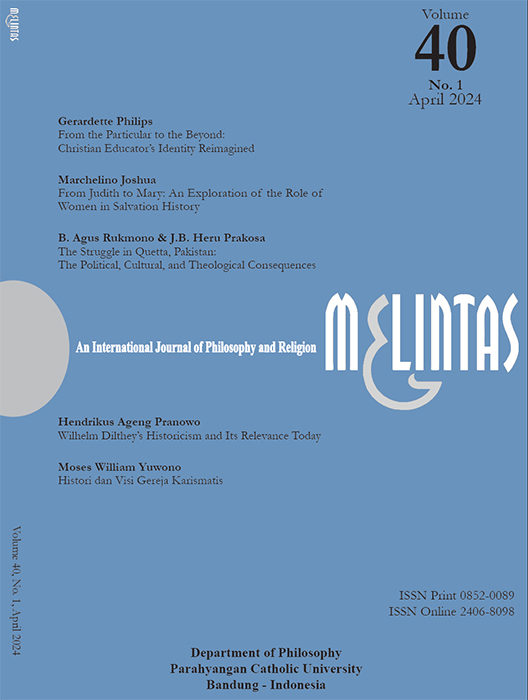Vol. 40 No. 1 (2024)

The question of identity is always a challenging and significant discourse, impacting the lives of citizens around the world. The difficulty is not in its continuity but in evaluating how genuinely new and complex these emerging forms of identity are. As technology advances, the way humans live their daily life changes dramatically. While technological breakthroughs in the previous century unfolded over decades, today, transformations occur within years, or even months. What has already happened often far precedes and reshapes what is happening now. A retrospective view is always, in some sense, prospective. In similar manner, what identity ‘was’ is always ‘is’ and “will probably be”.
This edition of Melintas provides several propositions to five different issues. The first article emphasizes the importance of Christian storytelling methods in education as a foundation for fostering a more humane understanding in an increasingly tumultuous world with conflicting interests. The author concludes that these barriers can only be overcome through powerful stories from inspiring figures, with the Eucharistic narrative being no exception. The second article explores the biblical figure Judith and the parallels between her and Mary, the mother of Jesus. Through exegetical methods and theological reflections, the author argues that both Judith and Mary represent an active essence of femininity that transcends the patriarchal limitations traditionally assigned to women in religious narratives. The third article analyzes the ongoing ethno-religious conflicts in Quetta, a region in Pakistan. The tumultuous situations have escalated into a string of violence that claims civilian lives. The authors reveal multiple causes as the root of this conflict. In their conclusion, they suggest an interethnic and interfaith dialogue mediated by an independent organization as a promising answer to resolve the political, cultural, and religious conundrums. The fourth article traces the root of historicism coined by Wilhelm Dilthey as a blending tool of analyses constructed on Kantian and Hegelian lines of thought. The author uses Dilthey’s approach to address the overuse and overemphasis of rationality in the Western culture, especially when dealing with pluralism and multiple identities. The fifth article put the advent of charismatic movements in Christianity on the spotlight, in that it is a phenomenon that cannot be simply put aside. Not merely an alternative approach to rejuvenating the Church’s ministry, the charismatic movement emphasizing the Renewal of Christian faith through the Holy Spirit urges a progressive demand for a charismatic Church. This, according to the author, is how the new religious identity embodies its present in an ever changing society.
The words “know thyself” coined by Socrates have proven to be one of the most difficult problems to answer. Nevertheless, endless efforts to provide the best answers have always been fruitful if not impactful. From human rights to emancipatory movements around the world, it is still one of the best questions that we have.
Editor.

